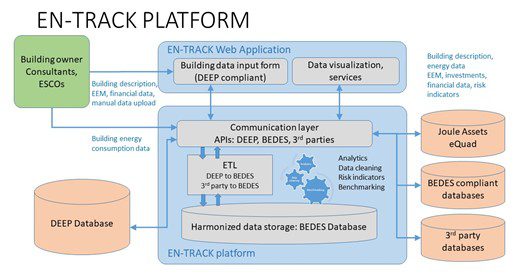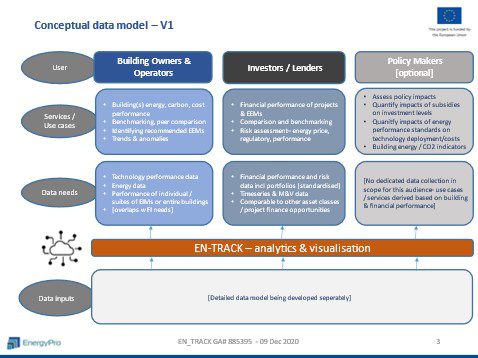The EN-TRACK platform is a data collection and analysis ecosystem allowing for the improved benchmarking and verification of energy improvement projects, for use by financial institutions, insurance underwriters, energy professionals and building owners/operators.

A collaborative project under the European Commission’s Horizon 2020 research programme

EN-TRACK builds on an existing infrastructure enabling massive data gathering, making the data comparable and interoperable with other existing databases, analysing this data and offering relevant results to key stakeholders.
This will support more informed, transparent and faster decision-making, contribute to the de-risking of investments in energy efficiency in buildings and facilitate process of closing investment deals.
The work in this consortium cements EnergyPro as a leader in energy efficiency finance methodology & helps develop data-driven M&V methodologies suitable for a wide range of energy improvement programmes. The work continues to develop EnergyPro’s contribution to de-risked energy efficiency investment, as well as developing commercialised approaches to wide-reaching energy improvement.
The final proposal for the EN-TRACK project was submitted in 2019, following on-going discussion and development in the energy efficiency finance space. EnergyPro joined the project consortium providing our expertise in energy efficiency standardisation and de-risking, and our links to Financial Institutions across the EU.
EnergyPro is currently leading the development in the following aspects of the project to ensure the database is standardised, verified and interoperable:
The challenge?
One of the principal challenges to increasing energy efficiency investments (EEI) is the lack of statistical data on the actual energy and costs savings achieved with them. Data is still hard to access because it is decentralized and in different formats. Consequently, only a small part of this can be used to produce reliable empirical evidence on the performance of the EEI.
How are we helping?
EN-TRACK aims to meet this challenge by enabling an interoperable ecosystem of data and tools supporting building refurbishment decision making, putting it into practice with the financial sector.
What are the benefits?
EN-TRACK represents a big step towards making energy efficiency investments a mainstream activity of the financial sector by enabling interoperability with active databases and tools allowing an unambiguous data exchange-based services ecosystem with low transactional costs.


Contact us to learn more about our work in standardising and de-risking energy efficiency finance assessment methodologies, supporting metered efficiency projects, and developing advanced M&V protocols

Alex has been an entrepreneur in the clean energy sector for around 15 years. He founded respected energy analytics business EEVS Insight in 2011 and has led a number of consultancy teams, advising corporate and public sector clients on energy strategies and developing innovative business models that make sense of energy efficiency. Alex holds a Masters degree in electrical engineering from Imperial College London and an MBA from Ashridge Business School, and is a Chartered Engineer. Alex has spent his entire career trying to address climate change, which he views as an unprecedented opportunity for creating a better, more equitable world.

Armin is a multifaceted professional and entrepreneur with more than 15 years of international experience working on clean energy topics in public and private sector organisations. He is fluent in English, French and German, and maintains an extensive global network in the energy sector. Armin is passionate about the role of policies and governance in driving the transition to a sustainable, low carbon energy system.

Connor provides an interdisciplinary background ranging from data structures to environmental economics and sociotechnical change. Connor earned a First-Class Master of Natural Sciences degree for his novel research into market-based carbon accounting and corporate signalling at the University of East Anglia, where he founded and continues to support the “Any Last Words?” climate communication competition, highlighting a long-standing commitment to improve science communication and climate engagement as a public good.

Steve is an author, public speaker, and global pioneer, driven in the pursuit of net zero and a regenerative economy. Steve has had significant impact on the energy transition in the UK and beyond with his work with corporates, investors, public sector bodies and governments. Steve is committed to implementing strong leadership and governance based on equitable and ethical business principles.